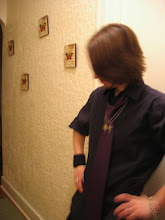In Memorandom
In thinking back on when I was with you, I realized this:
I can't recall who was the worst of us?
Was it I or you that slammed the car door that broke the window?
Where did all of that anger come from?
I can see the scene. Perfectly, still.
I can see you slamming the door and the window falling in. I see myself standing opposite the car, gazing into the fallen window - afraid.
But then.
I can see myself slamming the door and the window falling in. I see you standing opposite the car, gazing into the fallen window - afraid.
I see both of us sitting on the curb together, considering how you or I was wrong.
I can hear each of us calling the locksmith.
I can see each of us, in turn, paying for it.
Which is the correct vision?
I think both are.
And, for the first time, I can comprehend that past.
And, at last, hope to release it.
I can't recall who was the worst of us?
Was it I or you that slammed the car door that broke the window?
Where did all of that anger come from?
I can see the scene. Perfectly, still.
I can see you slamming the door and the window falling in. I see myself standing opposite the car, gazing into the fallen window - afraid.
But then.
I can see myself slamming the door and the window falling in. I see you standing opposite the car, gazing into the fallen window - afraid.
I see both of us sitting on the curb together, considering how you or I was wrong.
I can hear each of us calling the locksmith.
I can see each of us, in turn, paying for it.
Which is the correct vision?
I think both are.
And, for the first time, I can comprehend that past.
And, at last, hope to release it.
